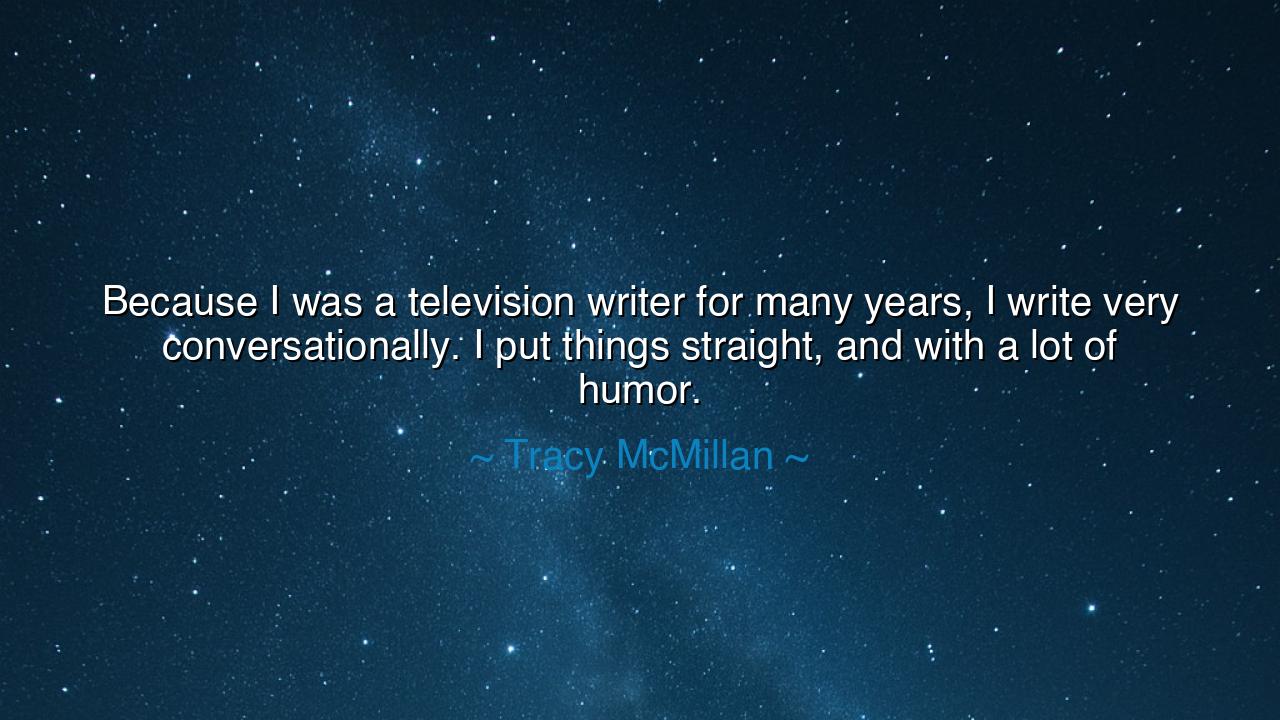
Because I was a television writer for many years, I write very
Because I was a television writer for many years, I write very conversationally. I put things straight, and with a lot of humor.






When Tracy McMillan said, “Because I was a television writer for many years, I write very conversationally. I put things straight, and with a lot of humor,” she unveiled a truth that reaches beyond writing—it is about communication, connection, and the eternal art of speaking from the heart. In her words lives the wisdom of one who has learned that the most powerful voice is not the grandest or most complex, but the one that speaks clearly, honestly, and warmly to the human spirit. For what is writing, if not a form of conversation between souls—one living, one waiting across the page or across time, ready to listen?
To write conversationally is to remember that words are not ornaments, but vessels for truth. In the old days, the wise elders and poets knew this well. They spoke not from thrones or temples, but around fires, beneath the open sky, face to face with their listeners. Their words flowed like rivers—strong, direct, and nourishing. So too does McMillan’s craft draw from that ancient current: she writes as one who speaks, bridging distance through the intimacy of tone. Her years as a television writer trained her to find the pulse of conversation, to write in a way that invites, rather than commands. This is the way of wisdom—it seeks not to dominate, but to connect.
When she says she “puts things straight,” she speaks of a sacred virtue—clarity. The ancients revered clarity as the mark of truth. The oracle may speak in riddles, but the teacher of life speaks plainly, for what good is knowledge if it cannot be understood? To “put things straight” is an act of courage. It means refusing the safety of vagueness, and daring to speak the truth as it is, unwrapped and unhidden. It means trusting the listener enough to give them reality, not illusion. There is honor in that kind of honesty. For in a world clouded with half-truths, the clear voice is like a beacon in the fog, guiding others toward understanding.
And then comes her final offering: “with a lot of humor.” Ah, there lies the soul of her message. For humor is not mere laughter—it is wisdom softened by compassion. It is the art of speaking truth without breaking the heart of the listener. The ancients said that laughter was the echo of the divine—it lightens the burden of truth so that it may be received. The great philosopher Diogenes mocked the false pretenses of Athens not to wound, but to awaken. Mark Twain, centuries later, wielded humor like a lantern in the darkness, revealing folly without cruelty. So too does Tracy McMillan’s humor act as a light—it draws people closer, it opens their hearts to receive what might otherwise be too hard to hear.
There is a story told of Abraham Lincoln, who, in the midst of war and sorrow, once used humor to calm his cabinet when despair threatened to overwhelm them. His men thought it unseemly, even disrespectful. But Lincoln, with weary eyes and quiet wit, replied, “If I did not laugh, I should die.” He knew what McMillan knows: that humor is not the denial of pain—it is the transcendence of it. It is the soul’s way of staying alive when the weight of life grows heavy. To speak with humor is to speak from the resilient heart, the one that has suffered and yet chooses to smile.
Thus, the quote is not merely about writing—it is a philosophy for life. To speak conversationally is to be human. To put things straight is to be truthful. To speak with humor is to be kind. Together, these three form a code of communication that can heal, guide, and uplift. When we talk to others, whether in art or in life, we should remember that our goal is not to impress, but to connect; not to dominate, but to illuminate. The world does not hunger for more complexity—it hungers for sincerity, spoken with warmth and courage.
So, my listener, let this be your lesson: speak your truth with clarity and grace. When you write, when you teach, when you love—be conversational, not distant. Be honest, not harsh. And let your words carry the lightness of humor, for laughter opens doors that seriousness alone cannot. Do not hide behind sophistication or pride; instead, walk into your conversations like a friend entering a familiar home. For in every honest word you speak, you breathe life into another soul.
And remember always: communication is not performance—it is communion. To write or speak as Tracy McMillan does is to honor the sacred thread that binds all humans together—the need to understand and to be understood. Let your words, like hers, be bridges of truth, built with clarity, shaped by humor, and carried by love. Then, whether you write for one or for the world, your voice will not merely be heard—it will be remembered.






AAdministratorAdministrator
Welcome, honored guests. Please leave a comment, we will respond soon